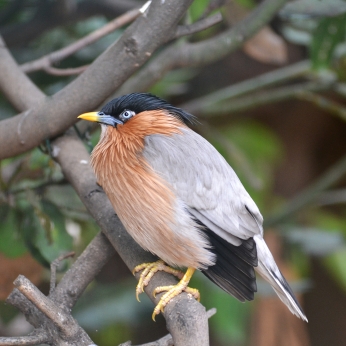Scientific Name:
Sturnus pagodarum
Distribution
Afghanistan, Bangladesh, China, India, Nepal, Pakistan, Sri Lanka.
Diet:
Omnivore. Insects (grasshoppers, crickets, earwigs, cockroaches, termites, bugs, butterflies, moths and their caterpillars, flies, ants, bees) and other invertebrates (spiders, snails), fruits (including figs) and berries, nectar from flowers.
Facts
Habitat: Open deciduous forest, cultivations, scrub, near human habitation.
Incubation: 12 days / 3-5 eggs
Social structure: Pairs, small or large groups
Weight: 40-54g
Dimensions: 20cm
Lifespan: 15-20 based on other starling species
Estimated population in the wild: Locally common
Threats: Habitat destruction and capture for the pet trade.
IUCN Status: Least Concern
Did you know that:
The name of the Brahminy starling comes from the similarity of the bird's head and neck crest to the Brahmin hairstyle of some Hindus and their habit to perch on temple Pagodas.






